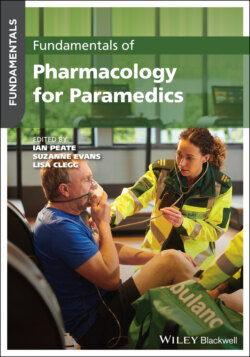Читать книгу Fundamentals of Pharmacology for Paramedics - Группа авторов - Страница 12
Оглавление
Preface
The key aim of Fundamentals of Pharmacology for Paramedics is to provide the reader with an understanding of the essentials associated with pharmacology and paramedic practice so as to enhance patient safety and patient outcomes. This book can help readers improve and expand their expertise and self‐confidence within the field of paramedicine and enable them to recognise and respond appropriately to the needs of those they offer care and support to, wherever this may be. The contributors to the text are all experienced clinicians and academics who have expertise in their sphere of practice.
Pharmacology is the study of how drugs, medicines and substances work together with the body when they are being used for the management of illness, disease, pain relief and other conditions. This can be everything from drugs that are used in respiratory care to the action of medications used as a vaccine.
The paramedic scope of practice at the point of registration continues to be developed within pre‐registration programmes of study around the world, ensuring that the newly qualified paramedic has the required knowledge and skills to provide best practice healthcare to patients. In many countries, this also includes ensuring that pre‐registration paramedic students are ‘prescriber ready’ once they have successfully completed their undergraduate programme of study.
If undergraduate paramedic students are to offer care that is safe and effective, then they must be prepared in such a way that they become accountable practitioners who are able to carry out their role in a meaningful manner that adheres to professional standards and aligns with the law. Fundamentals of Pharmacology for Paramedics will help paramedics add to their repertoire of skills as they gain appropriate pharmacological knowledge. Whilst there is a need to ensure that emphasis is placed on the principles of safe drug administration in undergraduate curricula, there is also a need to ensure that students are provided with the pharmacological foundations associated with the bigger issues related to medicines management. Knowing how to study this subject effectively is about developing an effective workable learning strategy. Fundamentals of Pharmacology for Paramedics provides the reader with an overview of the key issues that can support them as they begin to understand and apply the complexities associated with pharmacology as well as the exciting challenges that are ahead of them.
The text integrates comprehensive knowledge of pharmacology enabling the reader to formulate a plan of care that can improve the overall health and wellbeing of the patient. When advising on and dispensing or administering medicines, this must be done within the limits of the individual’s education, training and competence, professional body guidance and other relevant policies and regulations. It is essential to ensure that you keep to the laws of the country in which you are practising.
The paramedic must know the names, mechanism of action, indications, contraindications, complications, routes of administration, side‐effects, interactions, dose and any specific administration considerations for a range of medications. They have to understand relevant pharmacology as well as the administration of therapeutic medications.
The chapters in this book offer a range of teaching and learning resources that can help you come to terms with the often complex area of pharmacology and paramedicine. The book can be used in a number of ways; for example, you may choose to read Chapters 1–7 first and then dip in and out of the remaining chapters as you need them. Trying to learn everything at once has the potential to cause confusion which can eventually result in a loss of confidence, affecting your ability to learn and assimilate. Avoid trying to learn large volumes of information and copious amounts of detail all at once; focus instead on only those details that can help you achieve your aims.
Often pharmacology modules, as part of the wider curriculum, will require the student to safely administer the appropriate medication, correctly monitor medicated patients in accordance with established protocols/policy, understand the drug’s mechanism of action, indication for use, routes of administration, how the drug is absorbed, distributed, metabolised and eliminated, contraindications, drug interactions and a lot more. Recognising each drug you use and learning the differences and similarities between drugs is key to understanding the fundamentals of pharmacology. Pharmacology is an important subject and it is vital that you effectively learn the various drugs, their categories, mechanisms of action, pharmacodynamics and pharmacokinetics. The 17 chapters in this book will help you come to terms with what is often seen as a complex and sometimes terrifying subject.
The paramedic scope of practice at the point of registration continues to be developed within pre‐registration programmes of study, ensuring that the newly qualified paramedic is fit for practice. The scope of practice for specialist, advanced and consultant paramedics is being defined and refined around the world. A sound understanding of the fundamentals of pharmacology related to paramedicine will help you attain the goals that you set today.
We hope you enjoy using this book as you develop personally and professionally. Having a detailed understanding of how drugs work and why they are given has the potential to help you become a great paramedic.
Ian Peate, London, UKSuzanne Evans, Newcastle, New South Wales, AustraliaLisa Clegg, New South Wales, Australia
